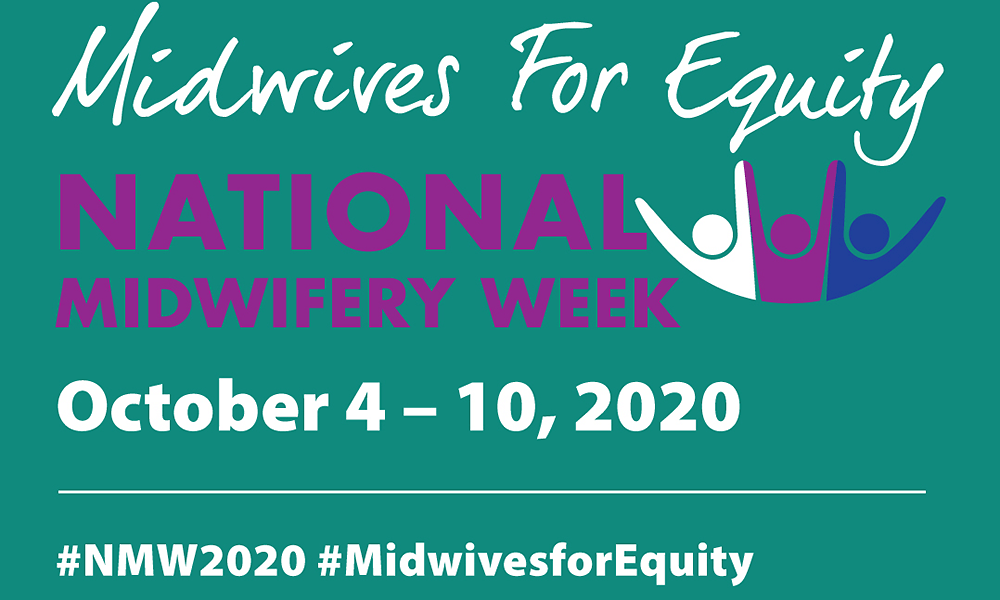 National Midwifery Week October 4-10, 2020. Midwives for equity.
National Midwifery Week October 4-10, 2020. Midwives for equity. Nurse-Midwives focus on a holistic approach to caring for the mother and baby during labor, delivery and beyond.
There are so many different aspects to nursing care that students don’t really know about, beyond the traditional medical-surgical-hospital role,” said Concordia University Clinical Nursing Instructor Kim Chobanian-Balash, MSN, RN. She and Monique Pogreba, MSN, MS, RN, teach the senior-level NURS 426 Family-Centered Nursing: OB and Women’s Health Clinical course. Both women recently completed additional master’s-level training to become Certified Nurse-Midwives.
In celebration of National Midwifery Week October 4-10, these educators wanted more people to learn about who they are and what they do as Certified Nurse-Midwives. They also want to give their students exposure to another nursing career option.
Becoming a midwife requires rigorous educational preparation and a commitment to improving women’s healthcare, according to the American College of Nurse-Midwives. Aspiring Nurse-Midwives are required to take coursework, spend hundreds of hours in clinical preparation and pass a national certification exam.
Pogreba entered the field for many reasons. “Because I was good with math and numbers, my family pushed me toward a career in mathematics or engineering,” she said. But she found her vocation in nursing, particularly helping African American women in urban settings. “I’ve always known I wanted to help improve women’s health and wellness.”
Pogreba serves downtown clients at the MLK Heritage Health Center on Dr. Martin Luther King Junior Drive, caring for women of all ages and socioeconomic backgrounds. She brings experiences from that role to her work with Concordia nursing students, too. “I love the sciences and medical studies, but my real calling is in helping all women have access to high quality care,” Pogreba said.
Today’s midwifery is about more than helping women give birth to healthy babies. It’s about providing healthcare options and opportunities to women, and empowering them to take an active role in making decisions about their own health. And while some midwives provide traditional support to women giving birth at home, many work within clinical and hospital settings to support women and families during labor, delivery, the post partum period, and beyond.
“I love that it feels like a sisterhood,” Pogreba said. “We’re different in our own ways as midwives, yet we have the same core values. We’re there to care for the woman.” Chobanian-Balash agreed, saying, “It’s very rewarding. I look forward to going to work every day. Once I started in this program I was 110% sure I made the right choice.”
Nurse-Midwives take care of the whole person, not just during a birth. They provide a full range of healthcare services for women from their teens to menopause.
“I was always interested in women’s health topics – even back in high school,” Chobanian-Balash said. “Back then I joined the Model United Nations and participated in initiatives focused on women’s rights. Later, based on my personal history with the healthcare system, I realized there are issues with a lack of education and informed consent that many women face, and felt there needed to be a change.”
Chobanian-Balash added that learning to be a Nurse-Midwife has been challenging during the COVID-19 pandemic. Hospitals are limiting the support people women can have with them during childbirth, making her role as a caregiver even more crucial. Labor and delivery require closeness and communication, yet women are giving birth while wearing a mask and a face shield, and their family and caregivers are wearing masks and shields, too. “It has been a whirlwind time,” she added. “It has really made me realize the importance of therapeutic communication.”
Congratulations to these Nurse-Midwives, who bring an added layer of richness to their teaching in the School of Nursing. We are grateful for their dedication to education, and to this vital role in the nursing profession!
—
If this story has inspired you, why not explore how you can help further Concordia's mission through giving.